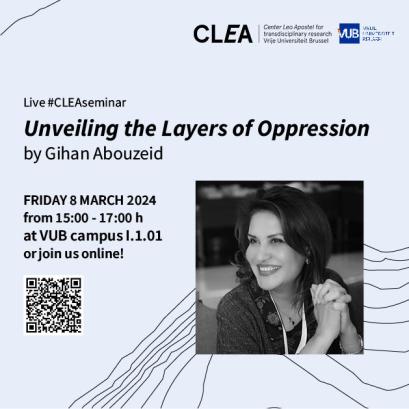There are many ways to study the spread of female Islamic preachers in Egypt, a phenomenon that began in the mid-eighties, creating a rare achievement for horizontally formed feminist groups. This presentation analyses female Islamic preachers as a result of intersecting systems to understand how they have become a tool for supporting the current oppressive systems.
The term “systems of oppression” helps to understand their historical, political, economic, cultural, social, and technological frameworks. The systems are woven by the hands of culture, economics, and history (occupation and globalization). Systems of oppression wrap around our bodies in layers, layer after layer. We all wear them, women and men, but women have “extra” coverings, which we may describe as veils. Veils are not necessarily the final layers. They are often only a cover that conceals the layers of oppression that the political, social, economic, and technological systems have combined to create — as if to hide history, colonialism, and patriarchy fostered by globalization and the latest imperialism. People in the so-called countries of the South are exposed to layers of oppression made up of local and international systems that protect, nurture, and ensure its continuation.
This presentation argues that oppression is a multi-dimensional system whose resistance requires awareness of its degrees and the relations between the different layers. Gihan Abouzeid’s analysis starts with Feminist Grounded Theory. Instead of having a specific social theory first and looking for evidence to support it, she studies (and lives) phenomena collecting information using a feminist lens and then follows where it leads her. It is a work in progress. With the other people at the seminar, Gihan would like to explore questions like:
How do different systems of oppression work together?
Regimes of oppression work together in harmony or conflict, but they agree together to build one layer of oppression after another. So how do we resist? Do the features of resistance differ between women and men?
How do progressive developments, such as the movement of female preachers that started as resistance, get turned into a tool in the hands of oppressive regimes?
About the speaker
Gihan Abouzeid is the team leader of "Critical Views on the Politics of Feminism," a regional research project by the Arab NGO ‘Network for Development’ (ANND). She works as a trainer and researcher for various UN agencies and other International organizations, with extensive experience working with civic societies, parliamentarians, and government officials in North Africa and other Arab countries. Gihan has written numerous formal reports, chapters, and articles in books and journals, and co-edited or co-authored several books. Her work looks at technology and gender, female preachers in society, violence against women, gender quotas, and gender mainstream in governments. She is a regular contributor to Arab newspapers, the BBC, and various German outlets.
Practical
The CLEA seminars are taking place simultaneously at the VUB campus and online (via Zoom) and are open to everyone interested!
When. Friday March 8, 2024 from 15:00 until 17:00 h
Where. VUB campus Pleinlaan 2, 1050 Elsene. Building I, room I.1.01
Online. You can follow the seminar online via Zoom. You may need a Meeting ID and passcode to enter.
Zoom link: https://us06web.zoom.us/j/82757798426?pwd=em9sQlJDVjJYTEFRNk01dEJLWGxGUT09
Meeting ID: 827 5779 8426
Passcode: 122127
Mailing list. If you want to be notified of our next seminars, you can register here to join the CLEA mailinglist.

